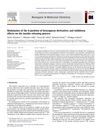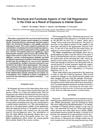 1 citations,
February 2022 in “Experimental Dermatology”
1 citations,
February 2022 in “Experimental Dermatology” Certain proteins are found at higher levels in balding areas compared to non-balding areas, suggesting a link to hair loss. This could be useful for diagnosing and treating hair loss.
 September 2005 in “Journal of Investigative Dermatology”
September 2005 in “Journal of Investigative Dermatology” Ferulic acid helps stabilize vitamins C and E for better skin protection from the sun, certain compounds may promote hair growth, atopic dermatitis patients have lower skin defense molecules, older men are more likely to get a type of skin cancer, and a substance called relaxin may prevent age-related skin thickening.
 January 2014 in “DOAJ (DOAJ: Directory of Open Access Journals)”
January 2014 in “DOAJ (DOAJ: Directory of Open Access Journals)” Platelet rich plasma may be beneficial for treating hair loss.
[object Object]  June 2019 in “Pediatric Dermatology”
June 2019 in “Pediatric Dermatology” Alopecia in patients with epidermolysis bullosa varies in severity and is often caused by skin blistering or trauma.
 35 citations,
April 2014 in “American Journal of Medical Genetics”
35 citations,
April 2014 in “American Journal of Medical Genetics” Boys with less severe EDA mutations in XLHED have milder symptoms and better sweat and hair production.
 May 2024 in “Frontiers in Immunology”
May 2024 in “Frontiers in Immunology” Type-2 immunity may influence skin diseases and could be targeted for treatment.
 January 2019 in “SAGE Open Medical Case Reports”
January 2019 in “SAGE Open Medical Case Reports” A scalp biopsy revealed systemic amyloidosis in a woman who initially seemed to have a common hair loss condition.
 84 citations,
June 2010 in “The Plant Cell”
84 citations,
June 2010 in “The Plant Cell” Phospholipase A2 is necessary for the correct placement of PIN proteins in plant roots, affecting root growth.
 109 citations,
October 2007 in “American Journal of Human Genetics”
109 citations,
October 2007 in “American Journal of Human Genetics” Giving a special protein to dogs with a certain genetic disease improved their symptoms but didn't help with hair growth.
 13 citations,
May 2011 in “Bioorganic & Medicinal Chemistry”
13 citations,
May 2011 in “Bioorganic & Medicinal Chemistry” Changing the 6-position on benzopyran molecules affects insulin release, with some compounds showing strong inhibitory effects.
Labrasol® in phospholipid vesicles improves minoxidil delivery to the skin, potentially aiding hair growth treatments.
 51 citations,
November 2020 in “Journal of the European Academy of Dermatology and Venereology”
51 citations,
November 2020 in “Journal of the European Academy of Dermatology and Venereology” COVID-19 infection may cause significant hair loss, but full hair recovery is likely without special treatment.
 January 2009 in “Bjog: An International Journal Of Obstetrics And Gynaecology”
January 2009 in “Bjog: An International Journal Of Obstetrics And Gynaecology” In 2009, there were new medical devices, treatments for gynecological conditions, updated health guidelines, and legal developments in women's health.
 63 citations,
January 1992 in “Experimental Neurology”
63 citations,
January 1992 in “Experimental Neurology” Chickens exposed to loud noise can quickly regain hearing mostly due to repair of the tectorial membrane, not just hair cell regeneration.
 119 citations,
October 1992 in “Fundamental & Clinical Pharmacology”
119 citations,
October 1992 in “Fundamental & Clinical Pharmacology” Potassium channel openers could help treat cardiovascular diseases and asthma but require better targeting to specific tissues for effective use.
 4 citations,
March 2012 in “InTech eBooks”
4 citations,
March 2012 in “InTech eBooks” Tree leaves and lichens can effectively indicate air pollution levels in cities.
 January 2024 in “Journal of neurogastroenterology and motility”
January 2024 in “Journal of neurogastroenterology and motility” Quadruple-coated probiotics significantly improve IBS symptoms.
 11 citations,
September 2019 in “Dermatologic Surgery”
11 citations,
September 2019 in “Dermatologic Surgery” A substance called Vascular Endothelial Growth Factor can protect certain hair follicle stem cells from damage caused by androgens, suggesting a new possible treatment for hair loss.
 29 citations,
December 2019 in “Transfusion and Apheresis Science”
29 citations,
December 2019 in “Transfusion and Apheresis Science” Platelet-derived bio-products help in wound healing and tissue regeneration but lack standardized methods, and their use in medicine is growing.
 1 citations,
January 2023 in “Brazilian Journals Editora eBooks”
1 citations,
January 2023 in “Brazilian Journals Editora eBooks” Children's screen time increased during the pandemic, causing various health issues.
 56 citations,
January 2021 in “Clinical and Experimental Medicine”
56 citations,
January 2021 in “Clinical and Experimental Medicine” The document concludes that while there are various treatments for Alopecia Areata, there is no cure, and individualized treatment plans are essential due to varying effectiveness.
 50 citations,
August 1999 in “Experimental dermatology”
50 citations,
August 1999 in “Experimental dermatology” The control system for hair growth cycles is not well understood and needs more research.
 1 citations,
June 2010 in “Expert Review of Dermatology”
1 citations,
June 2010 in “Expert Review of Dermatology” Covers common skin issues in kids, their diagnosis, treatment, and need for specialist care.
 10 citations,
October 2014 in “Journal of Ovarian Research”
10 citations,
October 2014 in “Journal of Ovarian Research” The IRS-2 Asp/Asp genotype may increase the risk of PCOS in Chinese women, especially if they are not obese.
[object Object]  6 citations,
May 2021 in “Clinical Chemistry and Laboratory Medicine”
6 citations,
May 2021 in “Clinical Chemistry and Laboratory Medicine” Different ACE2 gene versions may affect COVID-19 impact based on age and suggest some hair loss drugs could be potential treatments.
 12 citations,
August 2022 in “Biochemical Journal”
12 citations,
August 2022 in “Biochemical Journal” Different types of cell death affect skin health and inflammation, and understanding them could improve treatments for skin diseases.
 4 citations,
October 2007 in “Dermatologic Clinics”
4 citations,
October 2007 in “Dermatologic Clinics” Glucocorticoids and sex hormones affect skin health, with potential for targeted treatments to minimize side effects and treat skin conditions.
 23 citations,
August 2018 in “Biochimica and biophysica acta. Molecular and cell biology of lipids”
23 citations,
August 2018 in “Biochimica and biophysica acta. Molecular and cell biology of lipids” Different sPLA2 enzymes affect immunity, skin and hair health, reproduction, and may be potential targets for therapy.
 5 citations,
October 2014 in “Methods”
5 citations,
October 2014 in “Methods” The document explains how to create detailed biological pathways using genomic data and tools, with examples of hair and breast development.



























